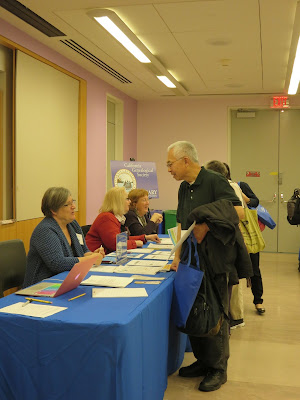Why did you start researching your
genealogy?
In high school, a history teacher asked
us to talk to our oldest living ancestors and construct a family tree. I
completed the assignment and the tree was tucked away. A year later, I met my future wife and was
impressed by the family tree her parents had hanging in the living room.
Fast
forward to 1985, a cousin of my mother sent her a scrapbook that had been put
together by their mutual grandmother and it rekindled my interest, but I didn’t
make much progress. Nine years later the
last of my grandparents died, so I sat down with my parents to ask them all the
things I should have asked her. With an upcoming move from Los Angeles to
Maryland, I knew I was finally ready to find out about my family’s origins.
What did you need to learn? Everything.
At this point, there was very little available on the Internet, so it
was very old school. Fortunately, living
in Maryland gave me close proximity to Washington, DC and its unique research
resources.
Suddenly,
all of our empty nester vacations had a family research objective for either my
wife or myself. We had a blast scouring New
England, NY, PA, WV, KY, OH, MT, GA for genealogy!
We
even made a few trips to Northern California.
I have roots in the area going back to 1868, plus it was where both of
our sons were attending college. Ok, so
it’s also beautiful and there’s San Francisco...
What helped you master genealogy research?
I attended several National Genealogical Society (NGS) conferences and learned a lot of the nuances of research. I was still living in Maryland and didn’t know
many people outside of work, so I threw myself into genealogy.
Some of the more useful things I picked up along
the way: How to use census index books, how many different
ways there are to spell the same name, the value of researching siblings, how
to research at a courthouse with their unusual indexing methods, how to read
property records and old maps, and how to read a family journal written in Welsh.
What were some of your first experiences with the
California Genealogical Society (CGS)?
As I faced retirement, I knew we
would be moving to the Bay Area to be near our son’s family in Alameda. I
searched for a good genealogical library and found CGS.
I became a member in
2007, two years before moving. Once settled into our new home, I volunteered to
do look-ups for the research group. I loved doing research for others and began
to get heavily involved with the society.
I’m also now a member of the board.
One thing I can definitely say, “I don’t feel retired!”
Although a lot of their microfilmed information (over 2 million rolls) is now
available on FamilySearch.org, about half
is not.
Although
I’ve done research in over 25 courthouses and more than twice as many local
libraries, in my opinion a trip to SLC is less
expensive and more productive than traveling all over the country.
Their
international records can’t be matched anywhere else in the world. Plus,
traveling with like-minded researchers exposes you to new ideas and sources. Fellow trip leader Lisa Gorrell and I are also
available each day to help point you in the right direction. Some of our attendees have been going every
year for the past decade!
Have you had a personal "a-ha/brick
wall break-through moment" while researching in Salt Lake City? If
so, would you describe?
I’ve busted several brick walls and
encountered some surprises, in addition to verifying many items found online.
Perhaps
most notable was what my wife found in one day. We knew she had a great grandmother born in
Sweden to English parents (Sprague) but didn’t know the story of why. I had
found a tree online that mentioned that two of the Sprague children were born
in Nova Scotia.
In
SLC, she was then able to find images of their birth registers. One register mentioned that the father was a
mining agent in Nova Scotia who in 1869 had married in Sweden, while the other
mentioned the name of the parish in Sweden. We still didn’t have our answer.
However,
at the international desk there was someone who spoke Swedish who found a Swedish
book that covered the parish that had been gleaned from the Canadian records. The
book mentioned that an English group had established the Swedish Copper Company
Ltd, in 1863---and voila, we understood! Because of all the incredible resources
available, I was later able to unfold the whole story using the incredible
Swedish church records for that parish.
Do you have any last thoughts on genealogy?
As a volunteer researcher for the California
Genealogical Society, I find that most of our research clients have already
gathered the low-hanging fruit of their family tree, either from family members
or popular online sites.
Our
researchers can lend value to a client primarily in four different ways:
- Breaking down brick walls
- Verifying unsourced “facts” in online trees
- Broadening your family tree in a search for cousins
- Seeking the truth behind various family
stories
Two
things to consider before embarking on your family’s genealogy: Your ancestors were human, subject to the
same aspirations and temptations we all face. And you will most likely find secrets that
are unknown to the current generation, which to some people may be inconvenient
truths.
Lastly,
due to the recent advances in DNA genealogy research, it is more important than
ever to identify the paper trail for each of our 32 great, great, great grandparents. They each have a story to tell, but we must
be vigilant to insure that the stories we discover are truly the stories of our ancestors.
That’s where genealogy research is
invaluable!

























